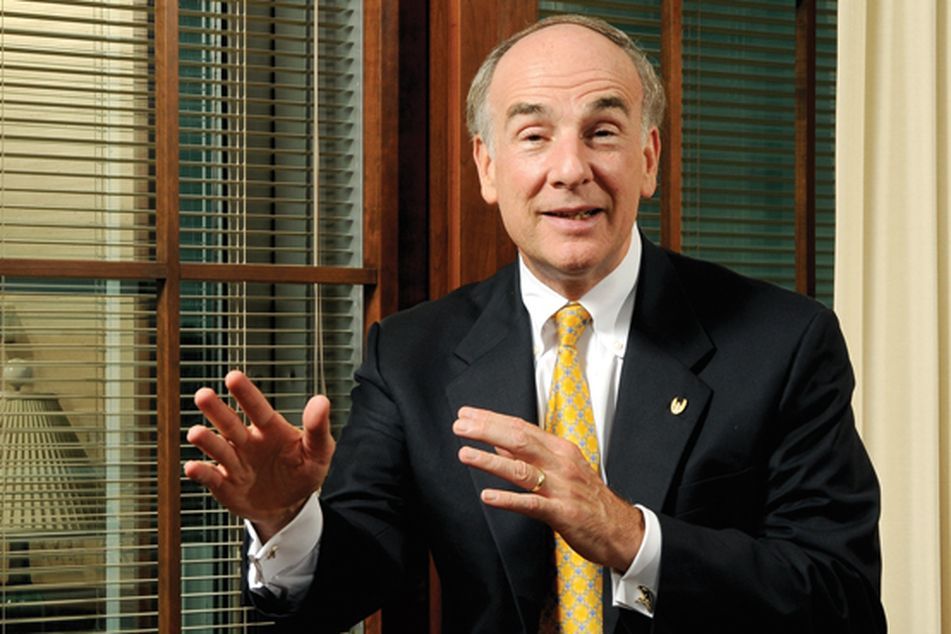No money fund victory lap for Federated’s Donahue just yet
 Donahue: Moving onto the next front
Donahue: Moving onto the next front
SEC may have bailed on money-market fund reform, but the Financial Stability Oversight Council looms ahead
Christopher Donahue, chief executive of Federated Investors and one of the most outspoken critics of money market reform, isn’t breathing easy just yet.
Mr. Donahue, along with the rest of the mutual fund industry, has been waging a nearly two-year public war with the Securities and Exchange Commission over the future of money market funds. That battle reached a critical juncture Wednesday night, when the SEC announced that the proposed reforms had been tabled.
While many have hailed it as a win for the mutual fund industry, Mr. Donahue sees it as simply another step. “It’s a victory for shareholders and public policy,” he said. “But it sets the stage for moving on to the next front. We’re preparing for the Financial Stability Oversight Council.”
The FSOC was established by Dodd-Frank financial reform law to oversee and monitor systematic risks to the financial system. With the SEC lacking support from its five commissioners to further pursue money market reform, any additional attempts would have to come from the FSOC. In her prepared statement announcing the canceled vote, Mary Schapiro, chairman of the SEC and a member of the council, hinted that the reform fight wasn’t over.
“The declaration by the three commissioners that they will not vote to propose reform now provides the needed clarity for other policymakers as they consider ways to address the systemic risks posed by money market funds,” she wrote. “I urge them to act with the same determination that the staff of the SEC has displayed over the past two years.”
Ms. Shapiro may have lost some prestige, however, in failing to get a majority of her agency’s five commissioners to agree on her plan for more money market reform. “The fact that Schapiro couldn’t get her three members of the commission to support this is really a national disgrace,” former SEC chairman Arthur Levitt said in an interview on Bloomberg radio Thursday.
Still, the FSOC could designate money market funds as non-bank systematically important financial institutions. Such a move would give the Federal Reserve Board power to regulate money market funds, said Jack Murphy, partner at law firm Dechert LLP.
“They’ve haven’t been a fan of money market funds pretty much ever,” he said.
Just how far the FSOC could go, such as forcing money market funds to have a floating net asset value or a capital buffer, would most likely be the focus of the next money market fight.
“They think they have unlimited power,” said Mr. Donahue. “We say they don’t have the legal ability to go after mutual funds in general and money market funds in particular. It’s a difference of opinion.”
Mr. Donahue has never shied away from sharing his opinions, especially when it comes to money market funds. He’s been one of the most vocal critics of the proposed reforms, calling them “brain dead” and predicting that they would destroy money markets. He even threatened to sue the SEC if the proposals became law.
“He eat, sleeps and breathes money market funds,” said Peter Crane, founder of Crane Data LLC, a money market research firm.
Mr. Donahue’s zeal for the industry isn’t unfounded. Federated’s relies on money market funds as its lifeblood.
Though Fidelity Investments and JPMorgan have more total assets in money market funds — $406 billion and $241 billion, respectively, as of July 31 — according to Crane Data, Federated’s $228 billion in money market funds represents 75% of its total assets. Fidelity’s make up just 27% and JPMorgan’s make up 35%, according to Bloomberg.
“It’s their bread and butter,” said Greggory Warren, stock analyst at Morningstar Inc.
The possibility of reform has been hanging over Federated’s stock for a while, he said. The day after Ms. Schapiro announced that the vote was off, shares jumped 4.5%.
The threat of more reform could lead to further gains for Federated.
“Longer-term, you’re probably looking at a more heavily regulated industry,” Mr. Warren said. “It’s going to be costlier to run and maintain these funds. You’re going to see a lot more guys walking away, and Federated could be the beneficiary of that.”
Federated has already shown that it’s more than happy to take money market assets off the hands of troubled firms. Even with the specter of SEC reforms, the firm has scooped up $6 billion of such assets in three separate acquisitions over the past three years.
“I’ve learned not to predict which way the regulators will go and when,” Mr. Donahue said. “We’ve been in this business almost 40 years, and we’re almost constantly in discussions with regulators over amendments and the very existence of money market funds. I still believe this is a good business to be in.”
Learn more about reprints and licensing for this article.



